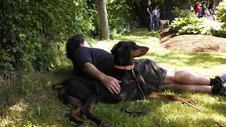
Our first dog, Jazz, did not think my husband was the center of her universe at first (for a good three months or so while we figured it out). Our second dog, Neptune, had some handling issues that took some time figuring out. Our fourth dog, Jackie CD, did not bond with my husband for six months (he had been returned for this several times after not bonding quickly to other men). Our fifth and sixth Dobermans, Boris and Stormy, did happen to instantly feel at home. Whether it was Jazz, Neptune, or Jackie CD or the hundreds of dogs that come through from clients, my love for dogs has nothing to do with them instantly accepting me. Bottom line is that you are building a relationship and need to earn trust and respect. You can not expect it will be given to you instantly until you put time and effort into the relationship.
1. A dog's previous history does not equal the potential of the dog. Though they may need some time and patience, dogs do very well going forward into their future, generally.
2. Each dog is an individual. You can not expect a new dog to replicate your relationship with a deceased or another dog. Realizing the individuality of the dog and appreciating it, is a first step towards your bond.
3. A dog may gravitate towards one member of the family at first, especially if that member spends more time with them. The family member that feels unbonded may want to spend a few weeks doing most of the things with the dog, while the other (super bonded) family member downplays their role until bonding begins.
4. Dogs have their own special interests. It is important to find out what interests your dog AND PARTICIPATE IN THAT ACTIVITY WITH THEM.
5. Generally speaking, it is a rare dog that won't bond with you, eventually.
6. IMHO it's a myth that a dog that doesn't bond quickly or immediately will be apt to be more aggressive or harder to train.
7. While most dogs generally give their heart unreservedly, some dogs need to trust their owner first to not only supply their basic necessities but to be there and keep them safe for the long term.
8. Not all dogs thrive mostly on treats and cuddling on the couch. In fact, I think most dogs thrive with owner participation in adventures, training, and exercise.
9. Some dogs with physical discomfort may feel discomfort with some types of handling.
10. Realize it is not all about the human owner, the dog is an individual and living entity that does not live solely for our pleasure.
11. Training is a way of creating a communication venue that will allow trust and understanding to develop between a dog and their owner.
12. Do not go too fast with the dog. The only one who realizes this is a long term arrangement is the human. Most dogs won't be totally comfortable with 100% familiarity. Hugging, kissing, and rough housing are best to do after you know your dog well.
13. Related to #12 having rules, even if you don't keep them in the future, is best to do when first meeting an adult dog. Limited or no access to furniture, no excessive treating, and supervised playing.
Remember a successful relationship with an adult dog is about appreciating dogs of all types and temperaments (there are some dogs that will be beyond your ability, and that is okay to seek help or return the dog), and being able to help them as well as offer them a place to exist.
Need help training and building your relationship with an adult dog or new puppy? Call, e-mail ([email protected]), or fill out our client interview form.
 RSS Feed
RSS Feed